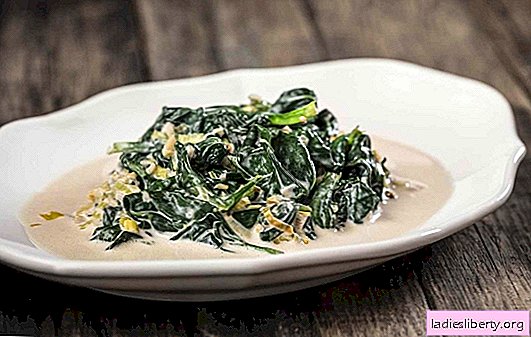
If the eyes are the mirror of the soul, then the tongue is the mirror of the gastrointestinal tract, and not only.
Language is a mirror of human health.
Often the disease proceeds for a long time without obvious signs and symptoms, and then an extensive picture of clinical symptoms suddenly appears.
In fact, you need to learn how to carefully monitor your body, and then the impending painful condition can be seen much earlier than the whole clinical picture. Immediate help in determining health is, of course, language. Its color, shape and plaque on the surface of the tongue will talk about acute pathology, and will help identify chronic diseases.
The language performs many important functions in the body: from recognizing the taste of food and pushing it into the esophagus to the formation of sounds and speech. Despite its small size, the tongue consists of 16 muscles, and its surface is covered with papillae of four groups involved in determining taste and touch. The papillae contain 10 thousand gustatory, thermal, biochemical analyzers that are associated with certain internal organs.
In a healthy person, the tongue is pink in color with an even fold in the middle, with well-defined papillae, soft, does not cause discomfort when moving. The tongue refers to the organs of the gastrointestinal tract and is actually the beginning of digestion.
Often you have to deal with such an unpleasant pathology as inflammation of the tongue - glossitis. Glossitis is an inflammatory process that occurs in the tissues of the tongue and is accompanied by a change in its color and structure. It can be either an independent disease or a manifestation of any serious general disease.
Tongue inflammation - causes
The causes of inflammation of the tongue: there are many and they are different. Glossitis can be: - of an infectious nature, when the cause of inflammation is conditionally pathogenic, pathogenic microorganisms, viruses and fungi;
- non-infectious - provoked by general diseases of the body;
- caused by other causes of a mechanical, thermal, chemical nature.
There are various risk factors under the influence of which, after a certain time, inflammation of the tongue develops:
- nicotine and alcohol;
- antibiotics;
- allergic irritants;
- non-observance of personal hygiene;
- injuries (sharp edge of the tooth, impact, prosthesis), i.e., mechanical damage.
A number of serious diseases can cause inflammation of the tongue:
- hypovitaminosis and vitamin deficiency (this relates to a deficiency of vitamins A, E, C, B12, folic acid);
- anemia;
- helminthic infestations;
- rheumatic manifestations;
- autoimmune diseases in which the body perceives its own cells as foreign (for example, systemic lupus erythematosus, etc.);
- lichen planus, characterized by itchy rashes on the skin and mucous membranes;
- Severe infectious diseases transmitted by airborne droplets: measles, scarlet fever, diphtheria;
- stomatitis.
Tongue inflammation - symptoms
Symptoms of inflammation of the tongue cause severe discomfort, a lot of discomfort, they are pronounced and easily recognizable.
1. An unpleasant annoying burning sensation appears that gives way to pain, due to which the diet, the usual way of life are violated.
2. Taste sensations are disturbed, food may seem tasteless or with unpleasant smacks.
3. The tongue swells, its mobility is limited, it may disturb the sensation of a foreign body in the mouth.
4. Speech quality may change.
5. The color of the tongue changes: it becomes burgundy or bright red, dry due to disruption of the salivary glands, can become covered with plaque, erosion and ulcers.
6. There is bad breath.
7. In severe cases, there is an increase in temperature and other signs of intoxication (general weakness, sweating, fatigue, poor sleep, headaches, various discomfort, chills).
If no measures are taken and treatment is not taken, the problem will worsen over time, and irreversible structural changes in the tissues of the tongue may occur.
Infectious inflammation of the tongue:
1. Candidiasis. Fungal inflammation of the tongue develops in people with reduced immunity or after a long course of antibiotic therapy. Symptoms are very unpleasant: dry tongue, severe pain, redness.
2. Herpetic inflammation of the tongue occurs with hypothermia, stress, during menstruation. Symptoms of inflammation of the tongue in this case: a large number of rashes and erosion, pain, hyperemia of damaged mucous membranes.
3. Herpes has to be differentiated with another infectious disease: streptococcal impetigo. Symptoms are rather unpleasant: vesicles with fluid, transforming into painful erosion.
Acute inflammation of the tongue immediately manifests itself with all the symptoms of inflammation: hyperemia, edema, pain. The cause of acute inflammation of the tongue is an infection or pathology, the source of which is another disease, for example, an allergy.
Chronic inflammation of the tongue is characterized by more restrained symptoms, there are no clear signs of inflammation, there is no intoxication, the clinic is lubricated. But changes in the structure of the organ itself are determined, their severity depends on the duration of the disease, the causes of glossitis. The treatment for chronic inflammation of the tongue is long, stubborn, often it is necessary to treat the underlying disease that caused the development of glossitis.
Tongue inflammation treatment
Treatment of inflammation of the tongue begins only after establishing the cause of glossitis, and, accordingly, clarifying the diagnosis. But in any case, you must immediately pay close attention to oral hygiene: be sure to thoroughly brush your teeth at least twice a day and rinse your mouth after each meal. The next important step: review your diet. At the time of treatment, exclude sharp, very hot and cold drinks and dishes, because it irritates the mucous membranes of the mouth and tongue, reduces the effectiveness and lengthens the treatment process.
Since inflammation of the tongue can be either an independent disease, or a manifestation of a disease of a certain organ or system, drugs are primarily prescribed during treatment aimed at eliminating the cause of glossitis. These can be antibiotics, antiviral, antimicrobial, antifungal, anti-inflammatory, anti-allergic, "gastric" drugs, depending on what needs to be treated.
In parallel, drugs are used for local treatment:
- mouthwash antiseptics (chlorhexidine, furatsilina solution);
- if necessary - anesthetic compresses to relieve pain (novocaine, trimecaine, lidocaine);
- preparations to accelerate tissue regeneration (rosehip oil, sea buckthorn oil, vitamin A, solcoseryl gel);
- with advanced forms and severe complications (phlegmon, abscess) - you have to resort to surgical intervention;
- immunomodulators and general strengthening therapy (including vitamin therapy) are prescribed to all patients with reduced immunity.
An important point of treatment is diet. It implies not only the exclusion of spicy, hot and cold food, but also the consistency of the cooked food: mashed, semi-liquid, gruel-like or mashed so that it can be swallowed painlessly.
With severe pain, you can switch to baby food. For problems with swallowing, you can drink through a tube. All food and drinks should be a little warm.
Folk remedies with inflammation of the tongue, they can be used as an additional treatment in parallel with the prescribed medication.
Traditional decoctions and infusions for rinsing the mouth with chamomile, sage, oak bark, calendula and other plants are used. Effective aloe juice, freshly squeezed potato juice.
To relieve pain, decoctions of mint and eucalyptus help well. - they are also used for rinsing. Tea tree oil has proven antibacterial properties: three drops of tea tree oil is added to two tablespoons of olive oil and the tongue is lubricated. These procedures must be repeated as often as possible.
With timely treatment and adequate treatment of inflammation of the tongue, started on time, the prognosis is favorable, despite all the severe symptoms. But some neglected forms, under a certain set of circumstances, can transform into a cancer, requiring other treatment methods, or be complicated by even more serious inflammations, or give frequent relapses.
In many cases, symptoms of inflammation of the tongue may not be so pronounced as to give rise to a doctor.
In order not to become a patient of the surgeon in the future due to complications and far-reaching diseases (phlegmon, abscesses, cancer), you need to carefully consider your feelings and carefully follow the rules of personal hygiene, do not ignore preventive measures.
An important point of prevention - giving up smoking and alcohol abuse, regular dental check-ups, which reduces the risk of tongue inflammation. These simple rules will significantly reduce the risk of the appearance and development of such an unpleasant pathology as inflammation of the tongue.











